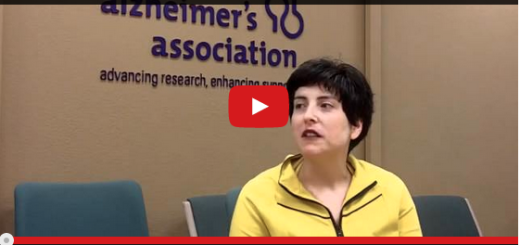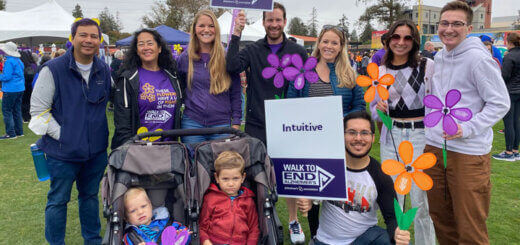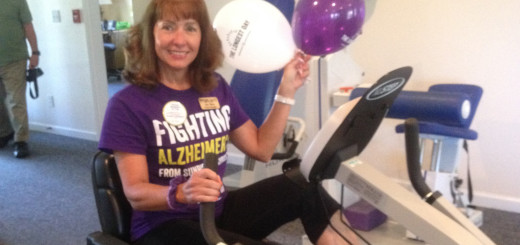Alzheimer’s Association support for the LGBT community
Arthur Chan moved from Hong Kong to San Francisco to be able to legally marry. As part of a project to increase dementia capable care for the LGBT community in San Francisco, Arthur shares his personal experience with discrimination as he trains service providers.
Arthur Chan was working as a clinical psychologist in a psychiatric hospital in Hong Kong when he met Terrence. They fell in love and wanted to plan a life together.
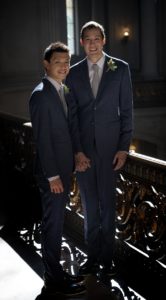
However, gay marriage is not legal in Hong Kong. Arthur and Terrence decided to relocate to the United States.
Terrence, an American, has family in the Bay Area. The couple moved to San Francisco in October of 2016 and got married in November 2016 at San Francisco City Hall.
Connections to Alzheimer’s
Alzheimer’s care was an important cause to Arthur, both professionally and personally. In his role as a clinical psychologist, Arthur conducted assessments and provided treatment to older adults with Alzheimer’s and other dementias.
His maternal grandmother, Chun, and paternal grandfather, Pedro, both lived with Alzheimer’s. Arthur was especially close to his grandmother.
As a child, Arthur often spent time with his grandmother while his parents worked. As the youngest grandchild, Arthur shared that she “spoiled me a lot.”
It was difficult for Arthur to leave Hong Kong. His grandmother was in the late stage of Alzheimer’s. Arthur felt guilty that he was so far away at the end of her life. But he knew that she would want him to be happy.
A different type of nonprofit
Arthur was looking for a job when he saw an ad for the Walk to End Alzheimer’s. He looked up the Alzheimer’s Association and discovered an opening for a Family Care Specialist who spoke English and Cantonese.
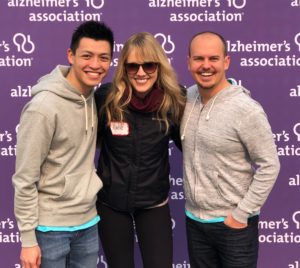
Arthur wanted to use his skills and experience to support persons with Alzheimer’s and caregivers. He successfully applied and started working for the Alzheimer’s Association in 2017.
In his role, Arthur provides education and support to the Asian and Pacific Islander (API) and lesbian, gay, bisexual and transgender (LGBT) communities. Arthur is part of the San Francisco LGBT Dementia Care Project.
Improving care
The San Francisco LGBT Dementia Care Project started in 2016. The goal is to better address the needs of LGBT seniors in San Francisco who are living with Alzheimer’s and related dementias or are caregivers.
Arthur and others have focused on training dementia care providers in a variety of fields. The trainings are free and continuing education units (CEUs) are offered. They have trained people from nursing, social work, family therapy, home care and residential care.
Participants learn how to serve members of the LGBT community who are affected by dementia. Topics focus on cultural humility, Alzheimer’s disease and best practices for working with the LGBT community.
Over the past three years, the team has provided 85 training sessions to over 1,300 individuals. Over 90 percent of participants rated the training as good/excellent. Trainings have been offered in English, Spanish and Cantonese.
The project has been funded by the San Francisco Department of Aging and Adult Services. It is a collaboration between the Alzheimer’s Association, Openhouse and the Family Caregiver Alliance.
“We treat everyone
equally”
Arthur has found that initially, many attendees are skeptical of the need for
training specifically focused on the LGBT community. Some mention that “all
communities should be equal” or that they “care for everyone in the same way.”
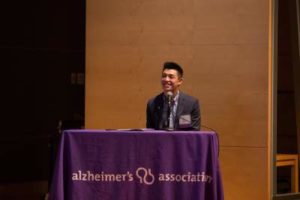
In the training, Arthur and the other presenters share:
- The history of discrimination and violence that many older LGBT adults have faced
- That some members of the LGBT community who are living with dementia may relive the trauma of past violence or hate crimes as the disease progresses
- How past negative experiences with healthcare or social service providers may impact their willingness to seek care and their trust in providers
Arthur shares his own personal experience to help the attendees understand the impact of discrimination. “I tell them that I came from a city where gay marriage was not legal,” Arthur said. “I talk about how I personally experienced discrimination and the impact it had on me.”
In his experience conducting the trainings, Arthur has found most attendees to be very open-minded. Many paid caregivers share that they haven’t had much training or personal experience working with the LGBT community.
Giving individuals the
confidence to seek services
In working with
members of the LGBT community who are facing Alzheimer’s, Arthur has found that
often they don’t know that there are resources to help them. They may also be
hesitant to seek help for fear of facing discrimination.
Sometimes, Arthur helps caregivers develop confidence in speaking to providers. Arthur shared a story of a caregiver in his 90s, who is caring for his husband, who is living with Alzheimer’s.
At an appointment, the doctor said, “you’re coming with your friend.” The caregiver felt offended that the doctor assumed they were just friends. It made him less likely to want to seek help.
Arthur validates their feelings and reassures the caregivers. Often they are used to hiding their feelings or not questioning authority. Arthur helps them problem-solve and come up with ideas on how they can handle similar situations in the future.
Project expansion
In the second phase of the project, Arthur and colleagues are forming the LGBT Dementia Care Network. They are inviting other groups to participate in enhancing service coordination.
The group wants to make it easier for providers to refer families to organizations who are trained to serve the needs of the LGBT community. They have also rolled out an additional training on effective communication with persons living with Alzheimer’s who are part of the LGBT community.
Changing misperceptions in the Chinese community
Besides his work on the LGBT Dementia Care Project, Arthur also provides education and support in the Chinese community. He has found that many in the older generations have internalized stigma about dementia.
When they notice signs in themselves or a loved one, they are reluctant to discuss it with others. Arthur works to correct the myth that dementia is a normal part of aging.
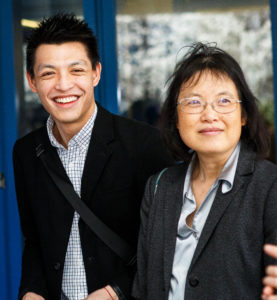
In the Chinese culture, people are often hesitant to question authority figures, including physicians. Arthur empowers them to ask more questions and/or seek another opinion, when needed.
Similar to his work in the LGBT community, Arthur helps connect families with providers who have demonstrated capacity to meet the family’s needs. “Agencies have services that target the Chinese community,” Arthur has found, “but a lot of times, the message doesn’t get to the community.” He helps connect families with service providers who understand their culture and speak Mandarin or Cantonese, when needed.
Providing the support they need
Besides providing trainings, Arthur enjoys the opportunity to speak with individuals and families. He is able to provide care consultations, listening to their stories and providing support.
“It can be physically and psychologically draining to live with Alzheimer’s or care for someone,” Arthur comments. “I let them know that they are not alone. We’re here for them.
“I believe in the vision and mission of the Alzheimer’s Association. It really touches my heart and motivates me. I want to help create a world without Alzheimer’s.”
Learn More





